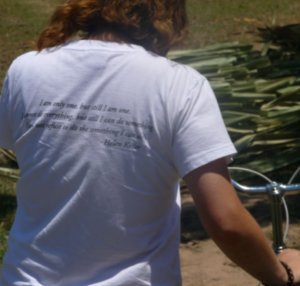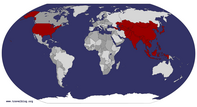Advertisement
Published: March 27th 2009

 Helen Keller quote on the back of PLF shirts:
Helen Keller quote on the back of PLF shirts:
"I am only one, but still I am one. I cannot do everything, but still I can do something. I will not refuse to do the something I can do."Things don't always unfold as planned...
It’s usually good to have a plan of some sort, and it’s even better to be able to change the plan when circumstances require. Many days here start with Plan A, shift into Plan B, and sometimes even slide right on into Plan C - or beyond.
On Wednesday, Plan A was to visit the Tchey school for a little while to say hello to the kids and teachers, and then to go to Tchey village and see where many of these kids live. All proceeded according to plan until we were at the school and heard the news that one of the students had had a house fire a few days earlier. Her family lost everything - house and all belongings - and there is no Red Cross or Salvation Army or State Farm insurance company here to cushion such a blow. The principal had asked each of the students to donate whatever small money they had in their pockets that day to give to the family, and that amounted to $6.
Rather than go to visit “the village” in general, it was decided that we should go see this family
and see what they might need. (Plan B.) We needed an interpreter, but Rithy, the teacher who is best able to serve in this role, had an English class to teach. Jaz was willing to take over his class for an hour to free him up, so Lori and Rithy and the principal and I went to see the family.
There was absolutely nothing left of their house but the concrete stilts on which it had been built. The site had been raked and swept, so there was a pile of roof tiles and a pile of charred timbers, but that was all that remained. Two parents and five children age 11 and under were left with nothing but the clothes on their backs and a two-sided palm-leaf hut with a rickety bamboo floor. The fire had been accidentally started by the five-year-old with an oil lamp, and the family was concerned about the other villagers who might want to beat him for this awful deed. The mother’s eyes were bloodshot red, whether from crying or smoke I don’t know. A few neighbors wandered over while we were there, maybe to see the family or maybe to see the
foreigners who showed up. Lori got to work making a list of the most urgent needs: school uniforms and supplies for the four children in school, a bag of rice, a cooking pot, bowls to eat out of, mosquito nets, sleeping mats, etc. We needed to measure the children for their uniforms so we improvised using a scarf as a measuring tape and measured the scarf against a piece of A4 paper. (“Waist: two A4’s plus an inch and a half.”) Lori made an emphatic point that the help would be coming from the school, not the foreigners, and that because the family sent their children to school regularly, they would receive this help. She worries a lot about foreigners being perceived as saviors, as opposed to Cambodians being seen as capable of solving their own problems, and she knows that the school principal is much respected in the village and wants to support his role. And she never misses an opportunity to promote education and honor the families who value it for their kids.
In the process of making the list and gathering information, there was a comical moment. Lori asked Rithy what the family did for a
living. Were they farmers? Did they work in town? Rithy consulted with the family and came back with the answer, “They sell drugs.”
Hmmmm, really? They sell drugs? “Yes, they sell drugs.”
Well, what kind of drugs?” (Lori gets extra points for such a logical follow-up question.) “Whatever they can pick up on the side of the road and sell for money - bottles, cans…”
Oh! They sell trash?! “Yes, they sell trash.”
With that detail cleared up and the list safely tucked in Lori’s folder, we headed back to school, where I finally got to watch Jaz teach. She had a bigger crowd than she was used to and she had had no preparation, and was doing a fine job. It was fun to see her in action.
Back on the tuktuk, we headed back into Siem Reap, with Lori furiously texting everyone in town that she knows to ask for clothing donations. While Jaz stayed at the guesthouse to work on her own English homework and prepare for her afternoon class at Wat Bo School, Lori and I headed to the market to buy some basic things the family needed. (We were now up to
Plan C.) The vendor in the local section of the market got straight to work showing us all manner of household goods, making suggestions, offering us small plastic chairs to sit on while they presented merchandise. Twenty-five minutes and $80 later, we had a pile: sleeping mats, large mosquito nets, four blankets, two cooking pots, ten bowls and ten spoons, and ten meters of heavy plastic. Ponheary was back at the guesthouse going through her nieces and nephews’ clothes for things that could be spared, and her sister and mother were in the storage room looking through leftover uniforms and school supplies to put together the right combination for each child. A bag of rice was ordered and people began calling Lori back with promises of more used clothing.
None of this in the mission of the foundation, but it is the kind of unanticipated need that just presents itself at times. No PLF money was used (except for the uniforms and school supplies, which are provided to kids every year anyway.) Without uniforms, the kids can’t go to school. Without mosquito nets, the family is at greater risk of malaria. Without rice and something to cook it in
and eat it with, the family doesn’t eat. Without sleeping mats, someone is going to get splinters from the rough bamboo slats or fall through it completely. And without food and a place to sleep and basic good health, the kids still can’t go to school, no matter how many uniforms they have. So it’s not directly in the PLF mission to provide for such catastrophes, but it certainly supports the mission.
When we returned the next day to deliver the goods, it became clear that one more basic need had not yet been met. The father’s job as a trash-picker means he needs a bicycle to ride along the roads and collect the bottles and cans and metal that can be sold to provide what little income they have. No bicycle = no work = no money. The school had offered two bicycles from their extras in storage, but the father accepted only one for his children to get to school. (Yes, one bike for four kids to get to school.) The school bikes are full-sized adult bikes, but not strong enough for his purposes. A strong “Cambodian bike” would be needed, but would cost $50, which the
family didn’t have.
Lori promised to see if she could find anyone who could help with the cost of a bike. And when we were back in the van, Jaz offered to be that someone. So off to the bike shop we went, where a nice strong bike was purchased, and we backtracked to the village to deliver it. (Are we up to Plan D now?) We had no interpreter with us this time, but the intent of our visit was pretty clear. The father looked quite delighted when he saw Jaz rolling the bike down the dirt path and through the rubble of their house, and wasted little time getting on to give it a test-drive and ring the bell. Big smiles were exchanged, and our mission was complete.
At a glance, this looks like a story of one family’s misfortune and other people’s response to their need, and in large part, that’s what it is. But along the way, there were layers of discussion and sorting through the cultural ramifications of providing this help. As I mentioned earlier, it is very important to Lori that the local people see the help as coming from one of
their own - the principal - or from the school, which makes perfectly good sense. She had concerns about how
much to provide, whether it would cause any problems within the village or resentment by other villagers. Would it reinforce the “foreign aid” culture and encourage people to sit and wait for rescue from wealthy foreigners? Discussions were had with Rithy and the principal to try to tease out all the answers, and Lori trusts the principal enough to accept his assurances that she was doing the right thing.
And the “presentation” of the goods was an interesting experience in itself. We would have all been happy to let the principal and teachers take the things to the family and leave us out of it, but they wanted us to be there. Not only that, but they wanted to arrange the goods in a display in front of the family and take photos, with the family kneeling in their hut, hands clasped and heads bowed in gratitude. It felt strange and awkward to me, but it seemed to be completely natural and comfortable to all of them, and it appears to be the Cambodian way to record the giving
of gifts in such a way. As the mother addressed us in Khmer, Rithy translated her traditional good wishes: “I wish you prosperity and a long life and good luck always.” I was struck by the strange irony that a Cambodian trash-picker living in a ramshackle palm-leaf hut was wishing me prosperity. It was a quiet ride back to town as thoughts about “prosperity” and other things tumbled through my head.
On a lighter note, there were other plans that developed and changed over the same 24-hour period. On Wednesday when we were first at Tchey School, the principal and assistant principal of Wat Bo School were there briefly and stopped to chat. We were without an interpreter at that moment and neither of them speaks much English, but the assistant principal managed to secure my commitment to come to Wat Bo school on Thursday morning to teach the lyrics to “Jingle Bells” to the music class. Yes, you read that correctly: “Jingle Bells.” They love this song and at two different assemblies we attended at Wat Bo School, the children have performed it, and what they lack in ability to articulate the lyrics, they make up for with great gusto and enthusiasm. One kid plays an electric keyboard, another plays a drum, a few play the accordion, many kids play handheld keyboards with a mouthpiece, arms are waved, and a girl “conducts” the whole affair. (If you haven’t already seen the online photo album with the “Jingle Bells” video, you can watch it
here.) Let me just tell you, there’s absolutely nothing like sitting in 103-degree heat watching 75 Cambodian kids play Jingle Bells accompanied by drums and accordions…
…Except perhaps trying to teach the lyrics to “Jingle Bells” to 75 Cambodian kids in a steamy hot music room. I didn’t really know what to expect when I agreed to this gig, but the assistant principal was so excited about it that I knew I couldn’t say no. I figured I
know the lyrics, so I guess I’m qualified.
At 8:00 am, 30 kids or so were in the music room, and they just kept coming and coming and coming. The teacher finally started turning kids away when the room was just too full, and I bet there were close to 100 kids in the room by then.
So we sang “Jingle Bells” for an hour, going through the lyrics line by line, working on pronunciation and timing - there are a couple of tricky parts where you actually come in a half-beat later than they thought. And at the end of the class, they broke out the instruments and played it with all their heart and soul. And as the kids ran off to their next class, the teacher asked, “You stay another hour?” I apologized for the fact that I couldn’t stay longer. “You come back this afternoon?” he asked hopefully. Well, that was possible, so I agreed to return later. His face lit up. “You stay how many hours in afternoon?” Uh, two hours…?
And at 2:00 this afternoon, I returned. The afternoon music teacher knew nothing about why I was coming, and had a class of only 15 kids who seemed to already know the lyrics pretty well, but I had a great time. After ten minutes, it became clear that they didn’t really need any Jingle Bells instruction from me, so
they taught
me the “Jingle Bells” dance moves - I never knew there dance moves! Then the girls performed some traditional Khmer songs and dances, while the boys horsed around and mimicked the girls. They requested that I sing Twinkle Twinkle Little Star with them, and then I taught them the Hokey Pokey, which they adored. I enjoyed seeing them act silly and laughing, and seeing the teacher join right in.
I'll get those photos posted sometime soon.
All in all, a couple of satisfying days…
Advertisement
Tot: 0.105s; Tpl: 0.019s; cc: 6; qc: 24; dbt: 0.0454s; 1; m:domysql w:travelblog (10.17.0.13); sld: 1;
; mem: 1.1mb













Darrell
non-member comment
Interesting reading